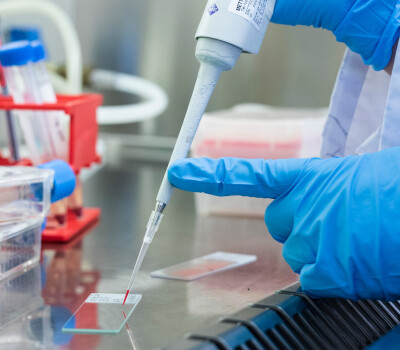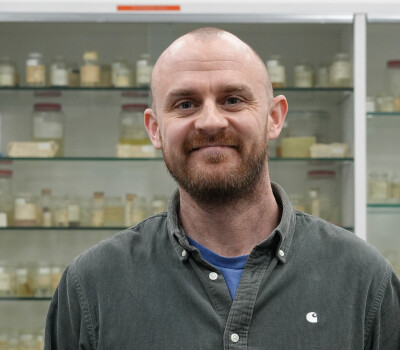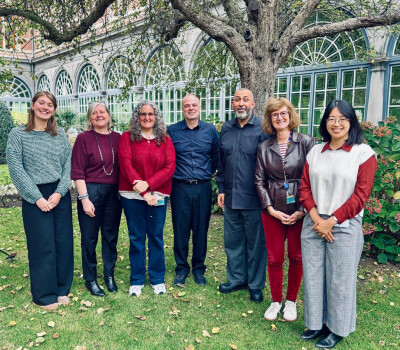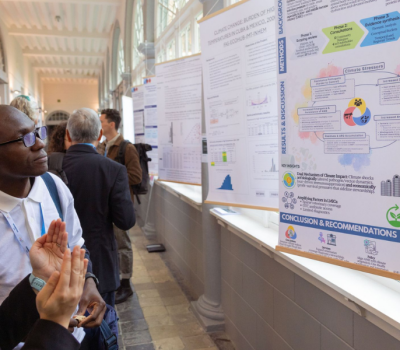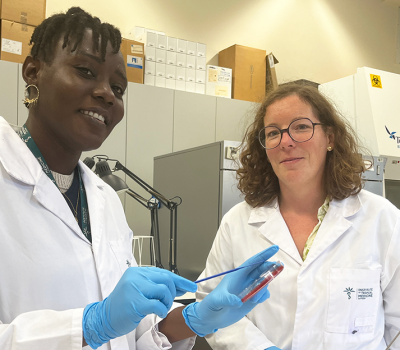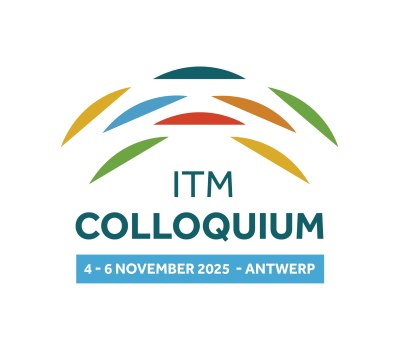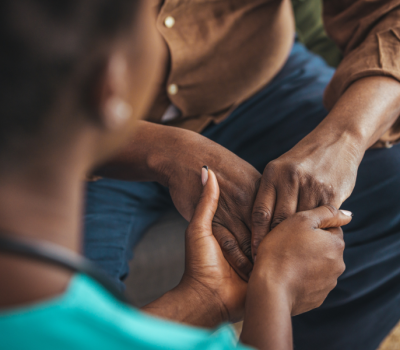Provincial Governor Cathy Berx says goodbye to ITM's Board of Governors

You were the chairperson of our Board of Governors for 14 years. Why are you stopping now?
That was my intention from the very beginning, I never intended to stay on longer than this. The old ITM statutes allowed me to stay. But that goes against my convictions. I think that as a board member, and especially as chair, it is best to limit the number of consecutive mandates to three. To me, it is the ideal way to allow new insights and a different perspectives to blossom. That is why I am stepping down, albeit with a lot of regret. However, I know that it is the right decision. I do not want to stand in the way of innovation and I would like to give others the opportunity to shape their vision.
How do you look back at that time?
With a lot of satisfaction, although there were some pretty intensive and tough times. I will cherish both ITM and my years as chair. It was a great privilege to take on this special role with extremely interesting and fine colleagues. The chairmanship has been intense, often very time-consuming and sometimes a source of concern. But even during the most turbulent times, ITM remained special. It was an educational and humanly enriching period. The whole experience has further stimulated my curiosity and internationally minded spirit. In short, I will greatly miss the institute and the chairmanship. But I also know that ITM, as a crucial pillar of the ecosystem of knowledge, research and educational institutions, will never disappear from my life completely. And that, above all, is a reassuring thought. I really don't need to be chair to foster an intense connection with the Institute.
What were the core issues of your presidency?
14 years ago, I worked very closely and eagerly with the previous director [Bruno Gryseels] on a new mission and vision for the institute, ITM 2020+. The essence of this was 'switching the poles' between North and South: from now on, the South and the LMIC (low and middle income countries) would choose their own partners in the North or elsewhere in the world and not the other way around. Because these countries would look for the very best partners, the focus of ITM had to shift to curiosity-driven scientific excellence. It is the only way for us to continue to position ourselves as an attractive partner, and maintain our special position and relevance as a competitor of the other institutions in the world.
The impact of this new vision on the organisation was significant. It meant, among other things, that we would distribute the funds competitively within the institute. Consequently, some funds and resources were also allocated internally on the basis of rankings. Some internal competition would make us stronger in attracting external funds and projects. And in return, we would generate more scientific and social impact.
This new vision also required a new management structure for ITM. After much deliberation, we have rewritten the statutes for that reason.
That adjustment of the statutes formed the basis for our current management structure?
Yes, it did. We abolished the Bureau, professionalised the Board of Governors and created the General Council to ensure representation from the South. Before that reform, the Board consisted mainly of people appointed to represent an organisation or government and to defend its interests. So they were not part of ITMs’ Board in a personal capacity. These external voices are, of course, essential to ITM, but in order to do justice to the new vision in terms of governance, a reform was necessary. The same also applied to the chairmanship. As provincial governor, I automatically became chair of the Board, and that for an indefinite period of time. This also seemed outdated.
The representation of other governments and organisations is now arranged by the introduction of a General Council with representatives of all relevant stakeholders. Not least with representation from the South, so that we always maintain an international perspective and keep ourselves on the right track. The creation of the General Council also allowed us to reform and strengthen the Board of Governors. The members of the Board are no longer nominated by stakeholders, but have to apply as candidates and demonstrate their added value for ITM.
This whole transformation was extremely difficult and often exhausting due to the necessary, sometimes tedious, focus on regulations and procedural issues. It has also had a direct impact on the structure of the Institute and its departments. By now, the added value is clear, so it was worth the effort. Thank goodness [laughs].
Which achievements are you most proud of?
The achievements of ITM are always and primarily the merit of the staff, the researchers and the teachers. In recent years, ITM’s scientific output, social relevance and impact have continued to increase in Belgium and abroad. And this occurs in times that are special to ITM for several reasons: as an infectious disease, COVID-19 hit the core business of the institute, but at the same time it has a strong impact on it, just like on the rest of society. As Board of Governors, you mainly try to create the circumstances to facilitate these achievements as well as possible. It is up to the Board of Governors, the director, the general manager, the department heads, scientists and all staff members, in short the entire ITM community, to make this happen. And ITM is doing a great job. It makes me genuinely happy that ITM has so many things to be proud of. If I have to look at myself, then I am particularly pleased that the General Council has gotten such strong representatives from the South.
Is there any particular moment that will stay with you?
I will never forget the visit of Felix Tshisekedi, the president of the DRC. It was the very last time that I got to speak with Professor Marleen Boelaert before for her untimely passing. She had lost a lot of weight but was as sharp and attentive as ever. When the President was informed about the project to eliminate sleeping sickness - with the financial support of the Bill & Melinda Gates Foundation and the Federal Government - , I asked a question during the practical session. That same evening I received an extensive e-mail from Marleen with a detailed answer to what she called "one of the most relevant questions". I still cherish that e-mail.
On that note, I would like to mention that at the beginning of 2020 De Tijd called “the elimination of sleeping sickness, coordinated by ITM with the support of DGD” one of the ten most hopeful evolutions in 2019...
And furthermore, I enjoyed every moment I could and did come to listen to the ITM choir.
May we know what question you asked Marleen at that time?
Yes, it was about the elimination of sleeping sickness. I wondered if and how we knew that we could eliminate the disease. What are the parameters to determine that a disease can be eradicated? And when is that point reached? How can you do this, measure it and monitor it? She explained this to me in great detail and pointed out the joint effort of such an operation by describing the roles of the different colleagues that are involved: Kevin Ariën, Jakke Van Den Abbeele, Paul Verlé and Philippe Büscher.
Do you still remember your first day at the institute?
Absolutely, and especially the meeting with Bruno Gryseels before that day... He visited me with an extensive pile of documents and took a lot of time to inform me in great detail about his plans and ambitions which he wanted me to help realise. When I entered ITM for the first time, I was most deeply impressed by the beautiful building, the stunning paintings and Room Broden. So much beauty, so much history, such a story, such a mission.
In previous interviews, we read that you are devoted to ITM. Why is the institute so special to you?
That has to do a lot, if not everything, with my father, my upbringing and what I find important in life [laughs]. My father travelled around the world for his work at Agfa-Gevaert. He would always be away for half of the year to some other faraway country: in Africa, South America, Asia or the Middle East. Even before I could read or write, I knew of the existence of a 'Tropical Institute' where he went to get his ‘shots’. With his appreciation for the Institute, I was also spoon-fed a love for all those foreign countries. It was not until much later in life that I actually came into contact with ITM and then all those memories came flooding back to me. As a doctor of law and lecturer at the University of Antwerp, my appreciation and understanding of the importance of science is great. Working with and for students keeps people young, sharp and curious. At least, that is how it should be. In a distant past, I was also vice-chairman of Antwerp's Public Centre for Social Welfare and a member of the Boards of Directors of Antwerp's hospitals. Education, attention to people and health, ... all those domains come together nicely at ITM. It really was a privilege to be chair for 14 years.
Do you think your presidency at ITM has had an influence on the way you fulfilled your role as provincial governor during the pandemic?
Undoubtedly. The contrary would be strange and even questionable. Shortly after the first lock-down was announced, I contacted Christiana Nöstlinger and the Public Health Department. Antwerp has more than 170 nationalities. I soon realised that some communities might be more difficult to reach and might have less access to the right information and care about COVID-19. As soon as the vaccines were available, a good communication with the many communities was needed. At that time, I was particularly grateful for the short communication lines with ITM. The Department of Public Health, among others, immediately picked up on these concerns and started a project. Many lecturers and others at ITM helped, including Marie Laga, Jef Verellen and also Stefaan Van der Borght. I continued to monitor the results.
After the first lockdown, the King and Queen visited ITM. Kevin Ariën's explanations about the virus itself and the development of vaccines, among other things, have remained in my thoughts for a long time. And let’s not forget Professor Erika Vlieghe's connection to ITM and her impressive role during the pandemic.
The great knowledge advantage was just as important. Thanks to the ITM experts, I gained many insights and was able to better understand the pandemic and the communication about it. I also always referred to ITM’s expertise in my contacts with other authorities.
Will the decision to step down free up a bit more time for other things or will your agenda remain just as full?
That is difficult to say, although I fear that the agenda will probably remain quite full. My appointment as a part-time lecturer at the University of Antwerp was just renewed. I hope I will finally find the time to rework my course into a monograph. I am privileged to be a member of several boards in the cultural sector. It would be nice to have a little more time for art and culture. Time will tell [laughs].
What good advice do you have for your successor?
Who am I to give 'good advice', or even 'advice' at all? If you insist: always listen carefully and stay alert for signals about and from the organisation.
What do you wish the staff and students of ITM for the future?
Boundless curiosity, great breakthroughs, the elimination of sleeping sickness and every other infectious disease that can be overcome by science and knowledge. Warm attention and commitment to high quality care for all, much eagerness to cooperate interdisciplinarily and internationally, a lasting bond with the alumni and good health, much job satisfaction and personal happiness.
Thank you for the pleasant conversation and all you have done for ITM. You remain very welcome and we hope to see you back often.
Spread the word! Share this story on


